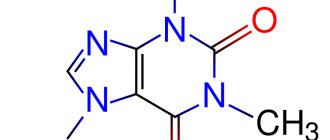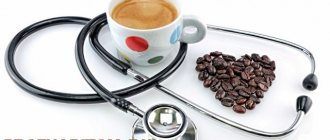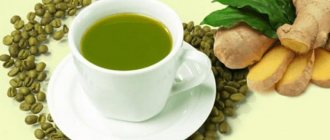General effects of caffeine on the body
The drink contains a significant amount of caffeine, which has a stimulating effect on the central nervous system and can have both positive and negative effects on the body.
| Benefits of caffeine | Harm of caffeine |
| Stimulation of the central nervous system. Caffeine improves performance, brain activity, reduces reaction speed, and enhances motor activity. | Reduces bone mass density and interferes with the absorption of calcium, which, with caffeine abuse, sometimes leads to the development of osteoporosis. |
| Eliminates or reduces drowsiness. | Disturbs the heart rhythm, increasing heart rate. |
| Bronchodilator effect. Makes breathing deeper. | If consumed in excess, it becomes addictive. |
| Reduces the likelihood of developing atherosclerosis. | Increases blood pressure. |
| Has an antispasmodic effect on smooth muscles. It has a stimulating effect on the striated area. | May increase pain and increase in lumps in the mammary gland with mastopathy. |
| Strengthens the secretion of gastric juice. | |
| Reduces the risk of diabetes. | |
| Stimulates metabolic processes in the body. | |
| Has a diuretic effect. |
Drinks made from chicory
Most often, chicory root is used as food in one of three forms :
- liquid;
- soluble;
- ground fried.
Due to the peculiarities of production, liquid chicory retains a large amount of useful substances . In addition, it is in this form that it is most convenient to store it. How is liquid chicory made?
At the first stage of production, beneficial substances are extracted from the root of the plant, which, in fact, give the taste and aroma to the drink. This process is repeated several times. Each time, the extract obtained at the previous extraction stage is taken as the starting product. After several cycles, a large amount of water is obtained, which is not recycled, but is evaporated using a special evaporation unit. And only after all these manipulations are completed, liquid chicory extract is obtained.
The first stages of making soluble chicory are similar to the production of liquid chicory. First, the beneficial substances from the plant root are extracted, but instead of evaporating the remaining liquid, spray drying is performed. As a result, excess water disappears, and the dry residue is chicory powder.
It should be noted that soluble chicory is sensitive to storage conditions. At high humidity, it oxidizes with loss of beneficial properties and the formation of lumps. Therefore, preference should be given to vacuum packaging, which prevents the penetration of moisture.
Ground (or roasted) chicory is the most natural, healthy, tasty and aromatic of all types of chicory. As the name suggests, to make it, the root of the plant is crushed and fried. Actually, this is all the processing.
Chemical composition of coffee
In total, coffee beans contain about 2,000 different substances. Interestingly, the chemical composition of the drink can vary depending on the type of coffee (ground or instant), its storage conditions and preparation method. But the basic set of elements remains the same:
- Carbohydrates. They provide the body's energy needs and form glycogen, in the form of which glucose is stored in cells.
- Caffeic acid ester. It has pronounced antioxidant properties and prevents the development of heart and vascular diseases. This compound regulates blood glucose and cholesterol levels and prevents the formation of malignant tumors. It has antiseptic, antibacterial and anti-inflammatory effects.
- Essential oils whose main component is caffeine.
- Flavonoids from the vitamin P group have the ability to strengthen the walls of blood vessels, reducing their fragility.
- Macroelements: potassium, phosphorus, calcium.
- Iron. A trace element that is part of hemoglobin, which ensures the transport of oxygen in the blood to the organs.
- Tannins.
- Oxalic acid.
- Lemon acid.
Potential harm of the drink to humans
Not all coffee is created equal. Thus, an instant drink does not bring any benefit, since during processing all useful substances are eliminated. In addition, instant coffee contains additional components in the form of flavor enhancers and flavorings that can be harmful.
The composition may contain harmful substances, so you should refrain from buying coffee varieties that are cheap. If the annotation indicates the content of dyes and flavors, such a drink will not be beneficial.
Coffee should not be combined with fatty and sweet foods. This combination sharply constricts blood vessels, including those of the liver, which impairs blood circulation. Regular overload of the gland provokes the development of hepatosis and metabolic disorders.
The effect of coffee on the liver
Gastroenterologists cannot say for sure whether coffee is good for the liver; their opinion is contradictory. Some doctors believe that the drink has a negative effect on the organ, while others advise patients suffering from certain pathologies to drink it without fear. But in any case, with uncontrolled consumption of coffee, it can cause liver pain. Like any product, a drink can affect the health of an organ, both positively and negatively.
Beneficial features
Coffee beans contain many beneficial substances that help improve the health of the liver and the entire body. Therefore, foreign scientists seriously approached the study of their properties. Research from the American Gastroenterological Association has shown that coffee may have a positive effect on the liver. The drink has a number of beneficial effects:
- It has a hepatoprotective effect - it prevents the destruction of hepatocytes and stimulates their restoration. Patients who regularly consumed this drink were less likely to experience deviations in biochemical tests.
- When used wisely, it prevents or slows down the development of fibrosis and cirrhosis.
- Reduces the possibility of obesity of the liver and other internal organs, as it improves metabolism.
- Prevents the formation of stones.
- Removes toxins.
- Prevents the occurrence of liver cancer. Italian researchers believe that coffee can reduce the risk of developing hepatocellular carcinoma (the most common form of liver cancer) by 40%
- Helps in the treatment of hepatitis C. Studies have shown that patients who regularly drink the drink in parallel with the main therapy are much more likely to experience positive dynamics.
Harmful properties
When asked whether coffee can cause liver pain, experts give a positive answer. Excessive use may result in heaviness and pain in the right side. In some cases, this drink can harm the health of the liver and the entire body, as it increases the formation of bile. Its stagnation has a detrimental effect on the general condition and appearance of the patient.
Instant drinks often contain flavoring additives that negatively affect all organs of the gastrointestinal tract, so it is contraindicated for diseases of the digestive system.
An unhealthy liver perceives strong coffee as a toxin, which it will try to get rid of. This increases the load and can disrupt the functioning of the organ.
Interesting research results
In 2006-2008, researchers from the National Cancer Institute (NCI) conducted clinical trials in which 1,000 volunteers with indolent hepatitis took part. They were divided into 3 groups:
- Group No. 1 – drank caffeinated coffee;
- Group No. 2 – drank decaffeinated coffee;
- Group 3 was forbidden to drink coffee.
The research results were published in 2010. Scientists found that the rate of progression of hepatitis was the lowest in patients from group No. 1.
According to clinical observations of hepatologists from Germany, drinking even 1 cup of drink per day reduces the risk of cirrhosis by 15-20%.
Scientists from the Russian Federation have found that drinking coffee for hepatitis is very beneficial. Due to the antioxidant effect, the level of substances that destroy liver cells is reduced. When drinking 1-2 cups of coffee per day, the rate of fibrotic changes in the parenchyma decreases.
The effect of coffee on the gallbladder and pancreas
Substances contained in coffee beans stimulate the gallbladder and pancreas, increasing the formation of bile and enzymes. In healthy people, the digestion process improves and the risk of stones decreases. Moderate consumption of the drink prevents the occurrence of diabetes. Caffeine provokes the release of adrenaline, which promotes increased production of insulin, an enzyme that breaks down glucose.
Attention! Abuse of the drink significantly increases the load on the pancreas and gallbladder and contributes to the occurrence of pancreatitis or cholecystitis.
How to drink coffee profitably
The caffeinated drink is rich in alkaloids, which increase the strength of vascular walls. This reduces the risk of esophageal varicose veins and internal bleeding. According to most gastroenterologists, coffee can be drunk at any stage of hepatitis, but in limited quantities.
Recommendations for drinking the drink during HCV infection:
- single dose – 100 ml;
- frequency of administration – no more than 3-4 times a day;
- The daily caffeine intake is 300-400 mg.
The therapeutic effect of the drink for hepatitis C depends on its variety and preparation characteristics.
Patients with viral hepatitis can drink caffeinated coffee. To achieve a hepatoprotective effect, you should:
- use only natural coffee;
- drink a sugar-free drink;
- Avoid instant coffee.
Doctors advise preparing the drink yourself. For hepatitis, coffee beans from two types of coffee trees are used - Coffea arabica and Coffea robusta. The fruits of the Canephora robusta coffee tree contain a lot of caffeine. Therefore, this type of coffee is consumed in limited quantities.
Patients with impaired bile circulation are allowed to add 1 tsp to the drink. sorbitol It has cholekinetic properties, that is, it accelerates the movement of bile into the duodenum.
Rules for use without harm to health
Thinking about whether drinking coffee is harmful to the health of the liver and the body as a whole, many people refuse to drink it. To ensure that the drink does not have a negative effect, you should choose it correctly and not exceed the recommended standards.
Quality
Buy only natural coffee, which retains most of the nutrients. The instant drink may cause digestive upset due to the food additives it contains. If possible, buy bean coffee rather than ground coffee. Avoid fragrances. High-quality coffee beans should not have any foreign odors (rubber, mold, burning).
Quantity
Scientists have found that the safe dose of caffeine for a healthy person is 400 mg. A cup of coffee, depending on its volume, may contain from 50 to 300 mg of the substance. Typically, 200 ml of drink contains 100 mg of caffeine. Therefore, you can drink 4 cups a day without harm to your health, if these are natural grains. Instant coffee should be drunk no more than 2 times a day, as it contains harmful food additives that adversely affect the health of the gastrointestinal tract.
Principles and norms of use
In the absence of direct contraindications, there is no reason to completely give up coffee. The drink can be beneficial for the body. To reduce the harmful effects of substances contained in coffee beans, it is recommended to follow some simple rules.
Principles for safe drinking coffee:
- It is better to choose Arabica rather than Robusta, as the first variety contains less caffeine.
- The drink should not be consumed on an empty stomach, as this increases the secretion of digestive juice.
- It is advisable to take a break of at least 3 hours between drinking cups.
- It is best to drink coffee 30-60 minutes after eating.
- During stressful situations and lack of sleep, it is worth reducing the amount of drink consumed so as not to overload the body.
- Smoking people should reduce their coffee consumption by 1.5-2 times to reduce the load on the heart and blood vessels.
- The drink negatively affects bones and joints. Therefore, older people should also drink it in limited quantities, up to 1 cup per day.
- It is not recommended to drink coffee with alcoholic beverages, as this combination increases the load on the heart.
Is it possible to drink if you are sick?
Classical dietetics, based on the textbook by M.I. Pevzner from the 30s of the last century denies us the pleasure. According to Soviet medicine, the only coffee that is suitable for a diseased liver is a barely cloudy drink with a lot of milk.
Modern medicine is not so categorical. In Europe and America, the drink is allowed, introducing only additional rules for use for various diseases:
- Enlarged liver. Complete exclusion of instant coffee, switching to natural freshly brewed analogues, giving up alcohol, sweets and fried foods are the general recommendations of nutritionists.
- Fatty hepatosis. Usually closely related to pre-existing lipid metabolism disorders and dietary imbalances. If the diet is dominated by fats, simple carbohydrates, and there is not enough protein, coffee can do little to spoil or correct anything. All doctors agree that if you have fatty hepatosis, you can drink 2 cups of black coffee a day, or dilute the drink with low-fat milk, or its plant analogue. You should not add a bun, chocolate or other sweets.
- Hepatitis. For hepatitis of any form, it is advised to follow a gentle diet and include low-fat foods, porridge from natural cereals, and lean poultry and fish in the diet, and drink only weak and natural coffee.
- Cirrhosis. The most severe disease, which affects metabolism very significantly, requires caffeine limitation. You can drink natural Americano no more than 1-2 times a week. If the disease is not severe, you can consult your doctor about drinking coffee more often.
Reasons to give up coffee
Sometimes even a small amount of coffee can have negative effects on your health. In the presence of certain conditions, the harm of the drink increases significantly. In such cases it should be abandoned. You should avoid drinking coffee if you experience the following symptoms:
- Pain in the heart area, headache. These symptoms may indicate high blood pressure and the development of heart disease.
- Yellow coating on the tongue, nausea, heartburn, indigestion, diarrhea. All these symptoms may indicate the development of gastrointestinal diseases.
- Pimples. Coffee contributes to oily skin.
- Peeling of nails. This phenomenon indicates a lack of calcium in the body.
You should also avoid drinking the drink on the day of an ultrasound scan, blood, urine, seminal fluid tests, in the postoperative period, after visiting the dentist, while wearing braces, during treatment with antibiotics and non-steroidal anti-inflammatory drugs.
Symptoms that require caffeine withdrawal
Caffeine stimulates the nervous system, increasing the activity of the respiratory, vasomotor and other centers. Therefore, it is not used to treat hepatitis in uncontrolled hypertension, mental disorders and some metabolic disorders.
Symptoms for which caffeine should not be consumed:
- bitterness in the mouth;
- pain in the right side;
- high blood pressure;
- headache;
- trembling in hands;
- rapid breathing;
- decreased appetite;
- nausea;
- sleep disturbance;
- bowel disorders;
- decreased diuresis;
- fast fatiguability.
In large doses, caffeine inhibits the activity of the central nervous system, which can impair breathing and myocardial contractility. Therefore, hepatologists do not recommend drinking coffee if you have serious concomitant diseases.
Improper preparation of coffee can increase blood cholesterol levels. Therefore, it must be boiled in a Turk, and not just poured with hot water. To prevent cardiovascular diseases, no more than 6 cups per day are allowed. Excessive caffeine consumption is dangerous due to calcium loss and osteoporosis.
When is coffee prohibited?
Due to the high caffeine content, drinking the drink has its limitations. Its invigorating effect is not always beneficial for the body. There is a whole list of conditions and diseases in which coffee can seriously harm your health. Cases when coffee is contraindicated:
- Gastrointestinal diseases: gastritis, gastric ulcer, pancreatitis, dysbacteriosis, poisoning.
- Cardiovascular system disorders: arrhythmia, arterial hypertension, atherosclerosis, varicose veins, strokes and heart attacks.
- Mastopathy.
- Uterine fibroids.
- Urolithiasis and other diseases of the kidneys and bladder.
- Hyperthyroidism.
- Allergy, psoriasis.
- Pregnancy.
- Children's age up to 10 years.
Drinking coffee will have a positive effect on both the liver and the entire body only in the absence of absolute contraindications. The main thing is to drink it correctly and in moderation so as not to harm your health.
General recommendations for drinking coffee
The ideal drink that has a beneficial effect on the body is freshly brewed cereal with or without low-fat milk, not sweet. You can drink it 2-3 times a day, one cup is 200-250 ml, the total daily dosage is no more than 700-800 ml of strong drink.
For liver diseases, only the black version is recommended without any additives. To soften the taste, you can use milk, but only low fat. Ideally, it is replaced with soy or oat milk product. Sweeteners can be used instead of sugar.
It is recommended to completely abandon instant drinks, which do not benefit the body. And patients rarely listen to this advice, because it is much faster to pour boiling water over 1-2 spoons of granules and enjoy the drink within 5 minutes.
It has been proven that the more the beans are roasted, the more potentially dangerous substances they contain. Therefore, it is better to choose a weak or medium roast, and alternate.
Special versions of the drink
For those who want to improve their cleansing properties and get more benefits, there are ethnic coffees with additives.
For example, in Chinese folk medicine, coffee is mixed with an extract of the Cordyceps tree fungus.
This product is often marketed as a weight loss drink, hepatoprotector, and immune booster. Yes, these properties are inherent in the mixture, but it cannot replace medications prescribed by a doctor. Coffee with cordyceps should be considered an interesting ethnic drink with beneficial properties.
Which doctor should I contact?
When a person experiences pain in the liver after coffee, one should limit, or better yet, completely stop drinking this drink to stop its dangerous effect on the body. To identify the reasons for this effect of both beneficial and harmful coffee on the liver, you should consult a doctor. A universal solution for the patient is to make an appointment with a therapist or general practitioner. You need to visit specialized specialists - a gastroenterologist, hepatologist, infectious disease specialist, oncologist .
After the initial examination, analysis of complaints and medical history, the patient will be sent to the laboratory for tests, as well as undergo instrumental diagnostics in the clinic. The results of the research will allow us to establish the underlying disease and begin its treatment.
© shutterstock
How to choose the right drink
When making instant coffee, various synthetic substances are added. Due to them, a special taste and aroma is acquired, but this composition is harmful to the liver. It is better to buy natural coffee beans and grind it yourself before preparing it.
However, the grains lose their aroma after a week of storage. You should not buy a product with a reserve.
Some people drink coffee without sugar. Spanish scientists have proven that sugar is an important component of a healthy drink. It improves brain function and restores muscles after physical activity. So you shouldn’t deny yourself pleasant things.










